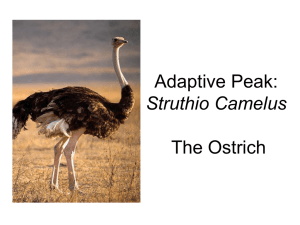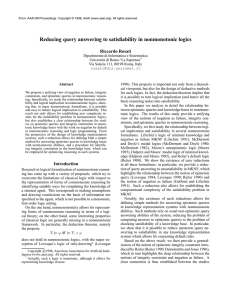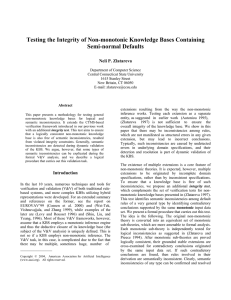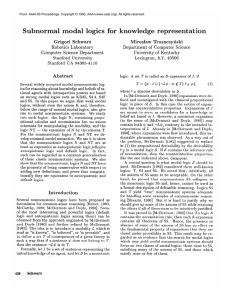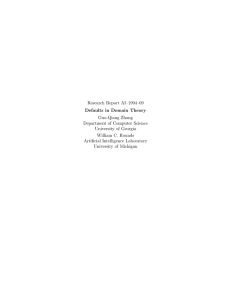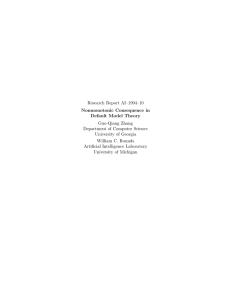Nonmonotonic Logic
advertisement
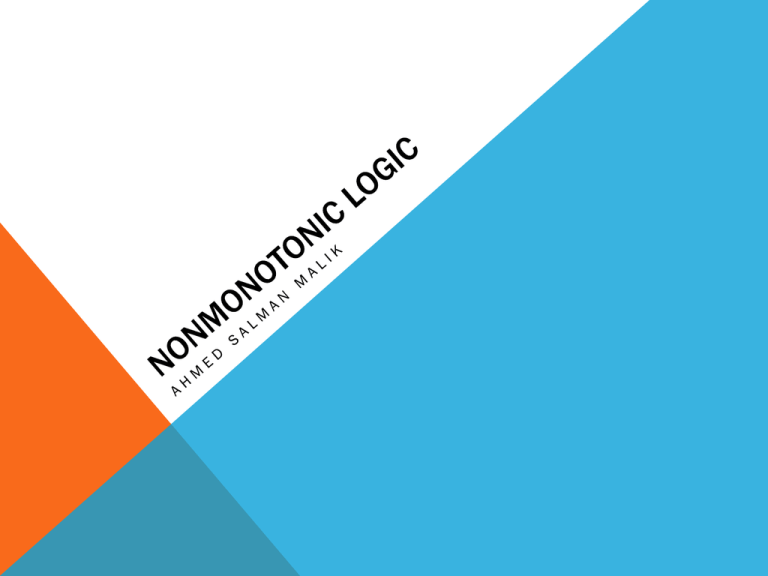
OVERVIEW Monotonic Logic Nonmonotonic Logic Usage and Applications Comparison with other forms of logic Related Topics Summary MONOTONIC LOGIC Standard type of logic If proven true, will be true forever Facts provided can’t be modified Doesn’t always fit in real life. Sidra is in Doha and Doha is in Qatar, so Sidra is in Qatar. Sidra can always take a trip to United States NONMONOTONIC LOGIC New facts can be added Current facts can be modified Conclusion can change If A → B before new fact Conclusion might change after new fact EXAMPLE Consider the following example All balls bounce Football is a ball Does football bounce Of course? What about a football with no air filled in? Conclusions change with new facts REAL LIFE USAGE Used in artificial intelligent systems For its adaptability Adding, removing and modifying facts To reach appropriate conclusions for appropriate scenarios APPLICATION Consider an example that can’t be handled by monotonic logic Birds can fly Seems logical, right? EXCEPTIONS? What about exceptions? Ostrich, Penguins EXCEPTIONS Bird(x) → Flies(x) How to handle exceptions? Bird(x) Abnormal(x) → Flies(x) Through nonmonotonic logic, we handle exceptions HANDLING EXCEPTIONS We know Ostrich(x) → Abnormal(x) Ostrich is not a normal bird We conclude Ostrich(x) → Bird(x) Flies(x) We make all exceptions this way SPECIFYING DEFAULTS Monotonic logic has formal systems to handle defaults Defaults: Known facts and rules Nonmonotonic logic uses incomplete and uncertain information to form patterns for decision making Abduction: Interpretation of the rules and facts. REASONING Default logic The predicate logic used as set of inferences Modal Operator - consistent with known facts x,y: A(x,y) B(x,y) C (x,y) Here B(x,y) is the Modal Operator ABDUCTION For a given fact A(x) → B(x) and A(x) is sufficient for B(x) Although, A(x) is not required for B(x) INHERITANCE DIAGRAM Flying Things Ostriches Birds Alma Jack COMPARISON WITH PROBABILITY Nomonontonic logic isn’t compatible with probability The uncertainty and addition of facts disturb the probability model. COMPARISON WITH CLASSICAL LOGIC Always results in a conclusion Classical logic might loop forever with incomplete information Would return wrong answer, instead of none. RELATED TOPICS Modal Logic Modelling reasoning about knowledge, actions or time Epistemic Logic Uses modal logic to reason about knowledge Deontic Logic The representation of normative knowledge SUMMARY Adapts with addition, removal and modification of new facts. Handling exceptions Used in artificial intelligence for decision making purposes Helpful where predicate or classic logic falls short

